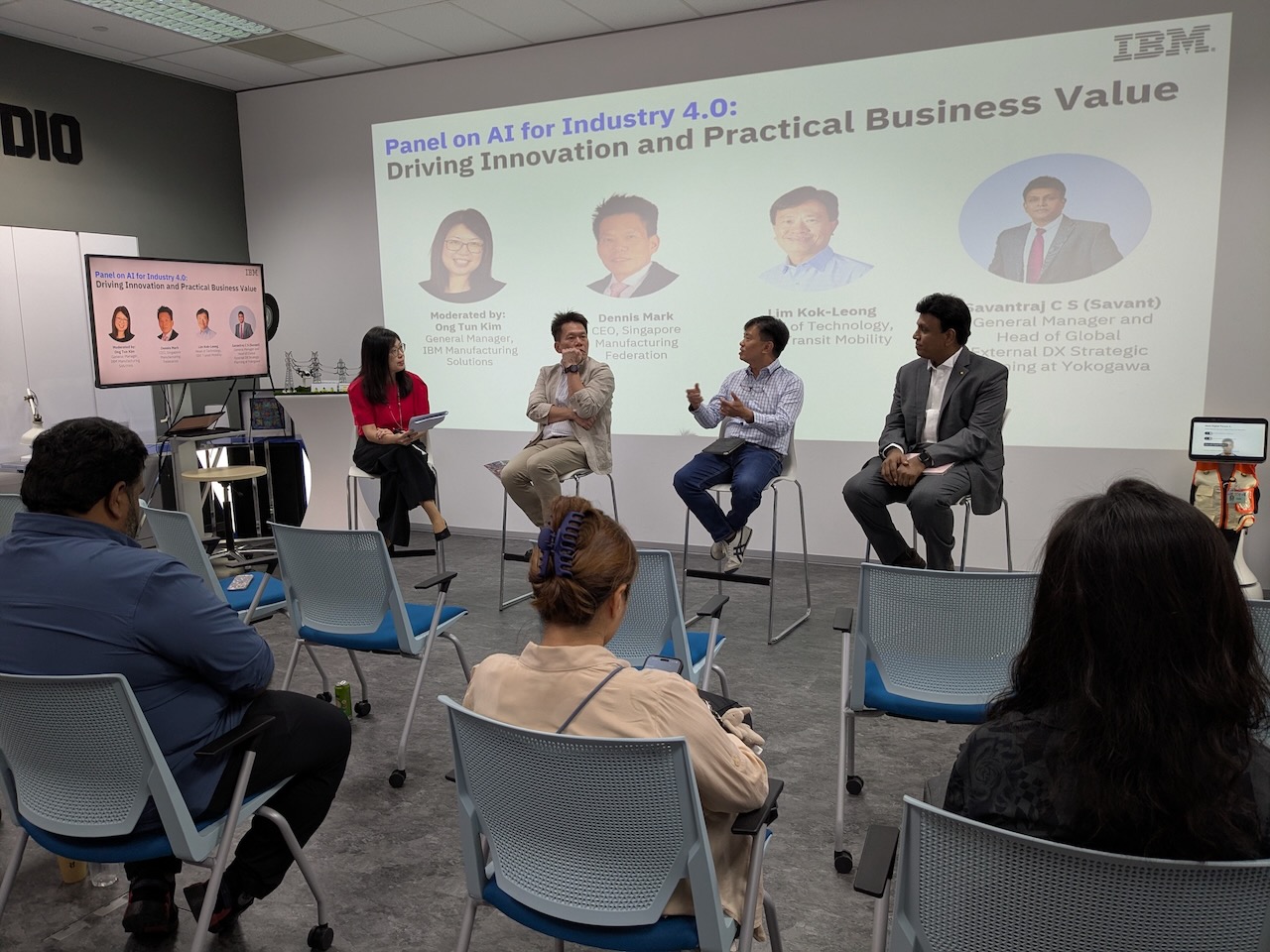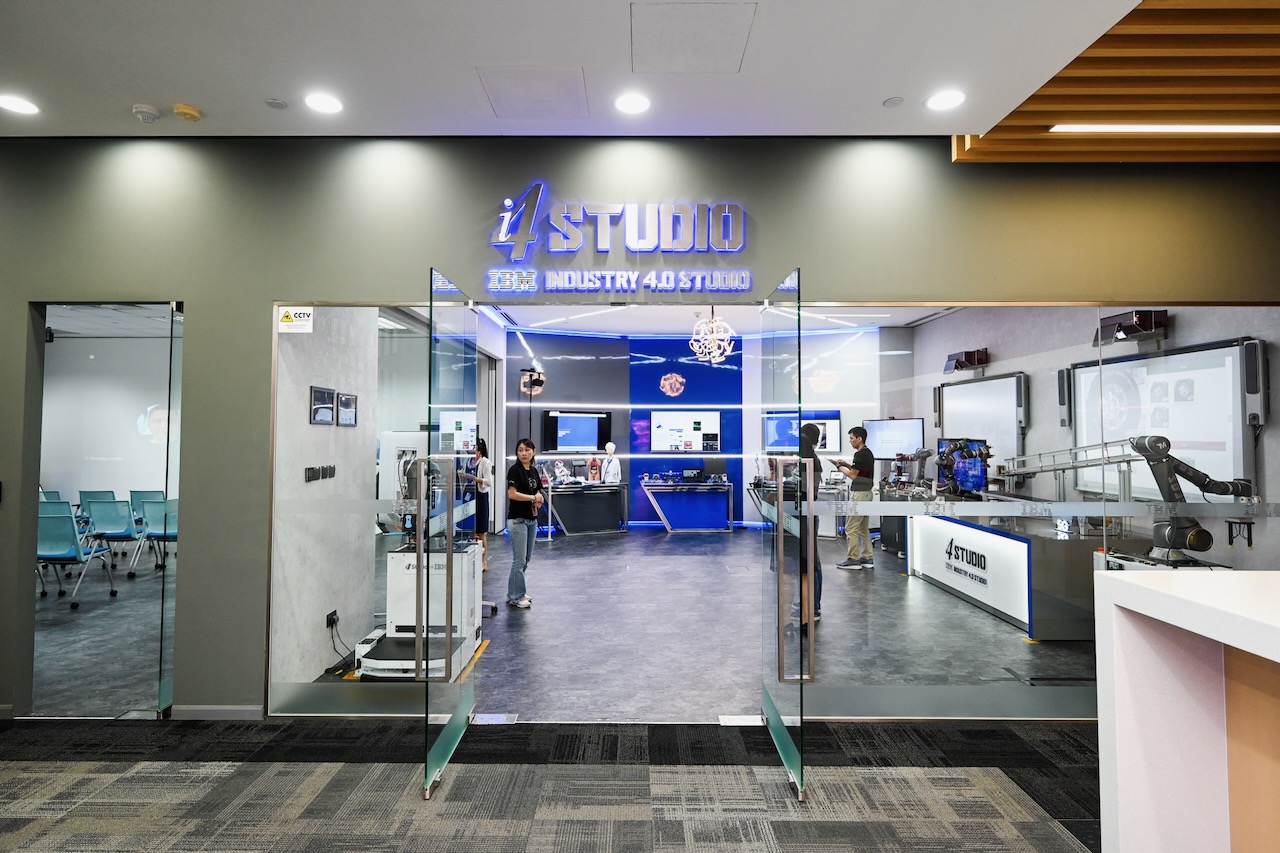AI/GenAI, this has been a recurring acronym and phrase that we have heard over and over again, whether in your work or personal life. Whether it is Artificial Intelligence (AI) or Generative AI (GenAI), you would have heard both the pros and cons for AI in your work and life, how AI might replace you or they are going to replace you, as well as how AI is helping you and improving your work and daily life. In fact, how much do you know about AI, and its impacts whether good or bad, across different industries? What’s the role of AI for Industry 4.0? Let’s hear about insights and sase studies from IBM Panel discussion.
IBM Panel Discussion “AI for Industry 4.0: Driving Innovation and Practical Business Value”
At a recent IBM Panel discussion on “AI for Industry 4.0: Driving Innovation and Practical Business Value”, organised by IBM Singapore at IBM Industry 4.0 Studio, Singapore, Ong Tun Kim, General Manager, IBM Manufacturing Solutions said, “AI will form the backbone of Industry 4.0”.
The adoption and rise of AI technology by companies are gaining more traction over the years. They are investing in AI and GenAI technology to gain competitive edge, introduce new offerings, lower production costs for complex products, accelerate their product launch timeline.

Industry leaders across different domains, came together for the IBM Panel session, namely,
- Dennis Mark, CEO, Singapore Manufacturing Federation
- Lim Kok Leong, Vice President, Head of Technology, SBS Transit Mobility
- Savantraj C S (Savant), General Manager and Head of Global External DX Strategic Planning, Yokogawa
AI today is empowering business leaders with speed and efficiency, enabling turnkey decision making for more efficient research, development and production lines for businesses and consumers across the world while enhancing productivity. For those in manufacturing operations, businesses are using AI to optimise their manufacturing operations, enhancing financial performance and achieving sustainability targets by improving both IT efficiency and business workflows.
Diverse and Invaluable Insights, Thoughts and Views from IBM Panel Discussion
Ong Tun Kim, General Manager of IBM Manufacturing Solutions, said, “According to the 2024 AI in Action Report, the Industrial sector is investing in a strong AI foundation. 37% of industrial companies have proven the benefits and are now focused on using AI. Generative AI is a step change in the evolution of AI. We see Manufacturing as an industry embracing Generative AI for expediting transformation into new digital product portfolio and new customer relations.”
Lim Kok Leong, Vice President, Head of Technology, SBS Transit Mobility, said, “For SBS Transit, AI, combined with smart use of data, is critical to drive higher rail reliability and efficiency that will go on to serve Singapore commuters well. “At SBS Transit, we are driven by the sole purpose of moving people in a safe, reliable and sustainable way. In our AI journey, we’ve integrated solutions like the IBM Maximo Suite with our proprietary IP assets to streamline asset management, improve predictive maintenance, and reduce downtime, all of which empowers us to fulfil our purpose effectively. These innovations also equip our engineers with AI-driven insights to anticipate and address issues before they arise and transform our operations to be more efficient too.”
Savantraj C S (Savant), General Manager, Yokogawa, said, “As a leading provider of Industrial Automation and Test and Measurement solutions, Yokogawa seeks to build next-gen autonomous operations with the aid of AI. “AI is the cornerstone of Yokogawa’s customer journey from Industrial Automation to Industrial Autonomy (IA2IA). In a time when industries face increasing complexity and pressure to improve efficiency and sustainability, our ‘‘AI First” vision aims to realise full autonomy where AI handles critical business processes, driving scale, scope, and business knowledge accumulation. Our goal is to empower AI to make autonomous decisions, optimise complex processes, and solve challenges beyond human insight — transforming industries with smarter, more resilient, and energy-efficient operations.”
Dennis Mark, CEO, Singapore Manufacturing Federation, commented “We’re only scratching the surface of AI’s capabilities. From predictive maintenance and quality control to the future vision of fully autonomous factories, the possibilities are endless.”He also highlighted the importance of a strong partnership and ecosystem to grow Singapore’s manufacturers and in helping them embrace AI. “The Singapore Manufacturing Federation is committed to fostering innovation, collaboration, and sustainable manufacturing for Singapore’s manufacturing ecosystem. Through strategic partnerships, we strengthen supply chains, accelerate AI adoption, and create business opportunities for both MNCs and local enterprises. With targeted training, and industry advocacy, we empower manufacturers to stay competitive and reinforce Singapore as a leading advanced manufacturing hub.”
Case Studies and Demo Showcases at IBM Industry 4.0 Studio
Attendees at IBM Panel Discussion were also brought on tour of IBM Industry 4.0 Studio, learning more about AI for Industry 4.0 through case studies and demo showcases.
- Case Study: Siriraj Piyamaharajkarun Hospital (SiPH), Thailand – Transforming Medical Diagnosis with AI Automation Workflow
- AI and automation are transforming medical diagnosis. In the case of SiPH, its Pathology lab aims to produce accurate pathology reports in the shortest possible time. SiPH approached IBM, with a vision to create a platform to provide a single decentralised, multi-users, multi-processes workflow with AI to provide a single source of truth with efficient data entry.
- The implementation tackled three areas: Digitising its workflow processes, introducing a hands-free digital form at the grossing station; and providing AI-powered analysis of digital pathology images.
- Learn more about the implementation here.
- Case Study: Singapore Civil Defence Force (SCDF) – AI-Driven Visual Inspection & Real-Time Monitoring
- How can AI and 5G be used to make equipment checks faster, more reliable, and less prone to human error for the Singapore Civil Defence Force? IBM introduced four strategies: Digitisation of processes with smart glasses; AI-assisted and automated inspection; synchronised inspection and Augmented Reality remote assistance.
- The result: Enhanced safety and operational efficiency for our frontliners.
- Learn more about the implementation here.
- Mixed Reality Experience – Interactive Training for Industry Applications
- AI is revolutionising training and troubleshooting in high-pressure industries using technologies like Mixed Reality. IBM showcased two scenarios where this can be applied:
- Medical training: Helping doctors to sharpen diagnostic and communication skills by role-playing as a junior doctor interacting with a troubled patient;
- Aviation troubleshooting: Guiding technicians with step-by-step instructions to resolve aircraft issues with precision.
- AI is revolutionising training and troubleshooting in high-pressure industries using technologies like Mixed Reality. IBM showcased two scenarios where this can be applied:
Thoughts and Views from IBM Panel Discussion “AI for Industry 4.0: Driving Innovation and Practical Business Value”
The IBM Panel Discussion was very insightful and invaluable for me as I am still learning more about how different industries use and implement AI in their respective workflows and areas where they are operating in, whether in a B2B or B2C capacity.
I remembered Dennis speaking at SMF inaugural Manufacturing Day Summit 2024, and Kok Leong at another enterprise technology media event. At the IBM Panel Discussion, they were able to share more insights, especially on how AI is playing crucial roles in their respective industries/scope of work. As for Savant from Yokogawa, it’s an eye opener and learning experience for me as I don’t have much coverage and understanding on industrial automation and test and management solutions.
The case studies and demo showcases helped to reinforce and enhance on how AI is playing key roles in various industries that not many people would know and understand, unless they are working in those respective industries.
I also recalled watching SCDF AI Driven Visual Inspection and Real-Time Monitoring in action during IBM Think Day 2023, it was a good recap and refresher for me.
On the usage of Mixed-Reality (MR) experiences, I recalled my personal experiences when I first encountered MR usage in enterprise technology (maybe 10 years ago). They weren’t comfortable and AI wasn’t even implemented. At the IBM Industry 4.0 showcase, MR technology has not only improved, the implementation and usage of AI is bringing up to another level for the industries using MR with AI.
Covering and writing about AI/GenAI technology developments and impacts over the past few years across various industries, it dawned upon me that each different industry has their own stories and experiences to share on how AI is helping and impacting them. I would continue to share and publish my learning, thoughts, views, insights and impacts of AI on different industries whenever the opportunity arises.
I would like to thank IBM Singapore for organising, inviting and hosting this IBM Panel Discussion, “AI for Industry 4.0: Driving Innovation and Practical Business Value”, together with case studies and demo showcases.
* Information and pictures courtesy of IBM Singapore and Weber Shandwick *
